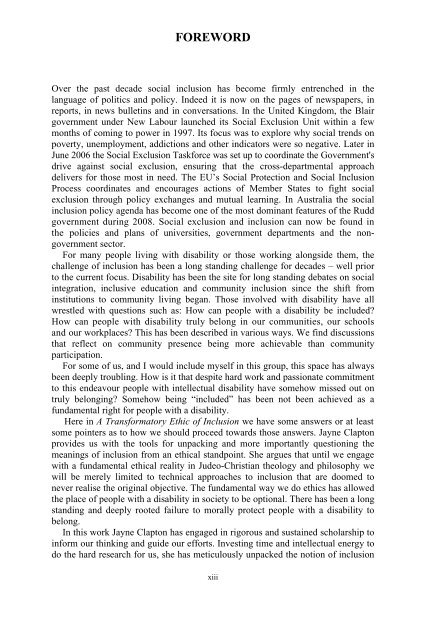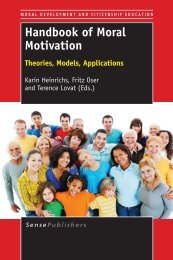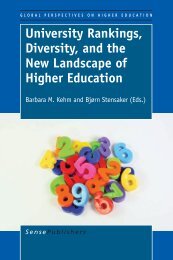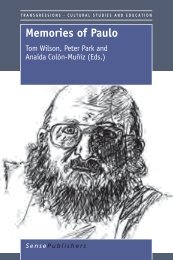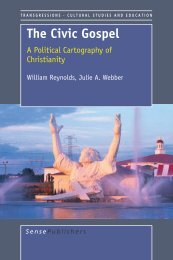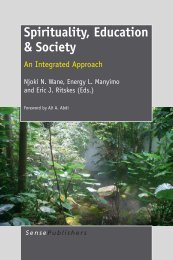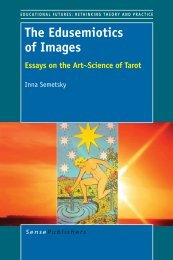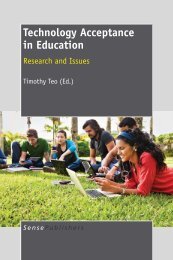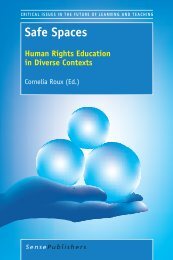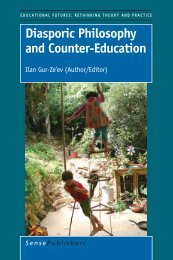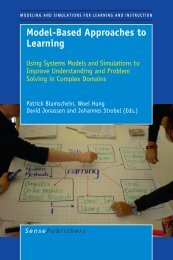Rupturing Concepts of Disability and Inclusion
Rupturing Concepts of Disability and Inclusion
Rupturing Concepts of Disability and Inclusion
You also want an ePaper? Increase the reach of your titles
YUMPU automatically turns print PDFs into web optimized ePapers that Google loves.
FOREWORD<br />
Over the past decade social inclusion has become firmly entrenched in the<br />
language <strong>of</strong> politics <strong>and</strong> policy. Indeed it is now on the pages <strong>of</strong> newspapers, in<br />
reports, in news bulletins <strong>and</strong> in conversations. In the United Kingdom, the Blair<br />
government under New Labour launched its Social Exclusion Unit within a few<br />
months <strong>of</strong> coming to power in 1997. Its focus was to explore why social trends on<br />
poverty, unemployment, addictions <strong>and</strong> other indicators were so negative. Later in<br />
June 2006 the Social Exclusion Taskforce was set up to coordinate the Government's<br />
drive against social exclusion, ensuring that the cross-departmental approach<br />
delivers for those most in need. The EU’s Social Protection <strong>and</strong> Social <strong>Inclusion</strong><br />
Process coordinates <strong>and</strong> encourages actions <strong>of</strong> Member States to fight social<br />
exclusion through policy exchanges <strong>and</strong> mutual learning. In Australia the social<br />
inclusion policy agenda has become one <strong>of</strong> the most dominant features <strong>of</strong> the Rudd<br />
government during 2008. Social exclusion <strong>and</strong> inclusion can now be found in<br />
the policies <strong>and</strong> plans <strong>of</strong> universities, government departments <strong>and</strong> the nongovernment<br />
sector.<br />
For many people living with disability or those working alongside them, the<br />
challenge <strong>of</strong> inclusion has been a long st<strong>and</strong>ing challenge for decades – well prior<br />
to the current focus. <strong>Disability</strong> has been the site for long st<strong>and</strong>ing debates on social<br />
integration, inclusive education <strong>and</strong> community inclusion since the shift from<br />
institutions to community living began. Those involved with disability have all<br />
wrestled with questions such as: How can people with a disability be included?<br />
How can people with disability truly belong in our communities, our schools<br />
<strong>and</strong> our workplaces? This has been described in various ways. We find discussions<br />
that reflect on community presence being more achievable than community<br />
participation.<br />
For some <strong>of</strong> us, <strong>and</strong> I would include myself in this group, this space has always<br />
been deeply troubling. How is it that despite hard work <strong>and</strong> passionate commitment<br />
to this endeavour people with intellectual disability have somehow missed out on<br />
truly belonging? Somehow being “included” has been not been achieved as a<br />
fundamental right for people with a disability.<br />
Here in A Transformatory Ethic <strong>of</strong> <strong>Inclusion</strong> we have some answers or at least<br />
some pointers as to how we should proceed towards those answers. Jayne Clapton<br />
provides us with the tools for unpacking <strong>and</strong> more importantly questioning the<br />
meanings <strong>of</strong> inclusion from an ethical st<strong>and</strong>point. She argues that until we engage<br />
with a fundamental ethical reality in Judeo-Christian theology <strong>and</strong> philosophy we<br />
will be merely limited to technical approaches to inclusion that are doomed to<br />
never realise the original objective. The fundamental way we do ethics has allowed<br />
the place <strong>of</strong> people with a disability in society to be optional. There has been a long<br />
st<strong>and</strong>ing <strong>and</strong> deeply rooted failure to morally protect people with a disability to<br />
belong.<br />
In this work Jayne Clapton has engaged in rigorous <strong>and</strong> sustained scholarship to<br />
inform our thinking <strong>and</strong> guide our efforts. Investing time <strong>and</strong> intellectual energy to<br />
do the hard research for us, she has meticulously unpacked the notion <strong>of</strong> inclusion<br />
xiii


